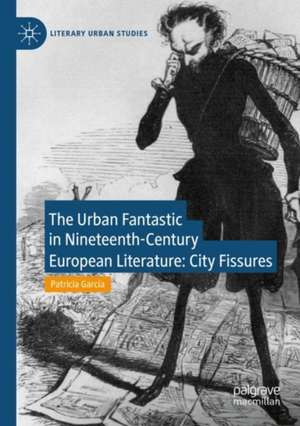The Urban Fantastic in Nineteenth-Century European Literature: City Fissures: Literary Urban Studies
Autor Patricia Garcíaen Limba Engleză Paperback – 19 ian 2023
| Toate formatele și edițiile | Preț | Express |
|---|---|---|
| Paperback (1) | 692.88 lei 6-8 săpt. | |
| Springer International Publishing – 19 ian 2023 | 692.88 lei 6-8 săpt. | |
| Hardback (1) | 698.30 lei 6-8 săpt. | |
| Springer International Publishing – 18 ian 2022 | 698.30 lei 6-8 săpt. |
Preț: 692.88 lei
Preț vechi: 815.16 lei
-15% Nou
Puncte Express: 1039
Preț estimativ în valută:
132.62€ • 136.67$ • 111.96£
132.62€ • 136.67$ • 111.96£
Carte tipărită la comandă
Livrare economică 03-17 martie
Preluare comenzi: 021 569.72.76
Specificații
ISBN-13: 9783030837785
ISBN-10: 3030837785
Pagini: 239
Ilustrații: XIV, 239 p. 10 illus., 7 illus. in color.
Dimensiuni: 148 x 210 mm
Greutate: 0.31 kg
Ediția:1st ed. 2021
Editura: Springer International Publishing
Colecția Palgrave Macmillan
Seria Literary Urban Studies
Locul publicării:Cham, Switzerland
ISBN-10: 3030837785
Pagini: 239
Ilustrații: XIV, 239 p. 10 illus., 7 illus. in color.
Dimensiuni: 148 x 210 mm
Greutate: 0.31 kg
Ediția:1st ed. 2021
Editura: Springer International Publishing
Colecția Palgrave Macmillan
Seria Literary Urban Studies
Locul publicării:Cham, Switzerland
Cuprins
Chapter 1: Introduction The Modern Fantastic: A Tale of Two Cities.- Chapter 2: Fantastic Antique Shops.- Chapter 3: The City’s Haunted Houses.- Chapter 4: Female Spirits of Space.- Chapter 5: Fantastic Exhibitions of the Self.- Chapter 6: The Ghosts of Public Transport.- Chapter 7: Cacophony and Asynchrony.- Chapter 8: Epilogue. Contemporary Revisitations.
Notă biografică
Patricia García is Ramón y Cajal Researcher at the Universidad de Alcalá, Spain. Her research focuses on narrative spaces and their intersection with urban studies, feminisms and with representations of the supernatural. She coordinates the network Fringe Urban Narratives: Peripheries, Identities, Intersections, has directed the project Gender and the Hispanic Fantastic (funded by the British Academy) and has been a fellow of the Helsinki Collegium for Advanced Studies (2018-2019) with a EURIAS fellowship. She is a member of Executive Committee of the European Society of Comparative Literature, of the Spanish Research Group on the Fantastic (Grupo de Estudios de lo Fantástico) and of the editorial board of BRUMAL: Research Journal on the Fantastic. Her most notable publications include the monograph Space and the Postmodern Fantastic in Contemporary Literature: the Architectural Void (2015).
Textul de pe ultima copertă
The Urban Fantastic in Nineteenth-Century European Literature explores transnational perspectives of modern city life in Europe by engaging with the fantastic tropes and metaphors used by writers of short fiction. Focusing on the literary city and literary representations of urban experience throughout the nineteenth century, the works discussed incorporate supernatural occurrences in a European city and the supernatural of these stories stems from and belongs to the city. The argument is structured around three primary themes. “Architectures”, “Encounters” and “Rhythms” make reference to three axes of city life: material space, human encounters, and movement. This thematic approach highlights cultural continuities and thus supports the use of the label of “urban fantastic” within and across the European traditions studied here.
Patricia García is Ramón y Cajal Researcher at the Universidad de Alcalá, Spain. Her research focuses on narrative spaces and their intersection with urban studies, feminisms and with representations of the supernatural. She coordinates the network Fringe Urban Narratives: Peripheries, Identities, Intersections, has directed the project Gender and the Hispanic Fantastic (funded by the British Academy) and has been a fellow of the Helsinki Collegium for Advanced Studies (2018-2019) with a EURIAS fellowship. She is a member of Executive Committee of the European Society of Comparative Literature, of the Spanish Research Group on the Fantastic (Grupo de Estudios de lo Fantástico) and of the editorial board of BRUMAL: Research Journal on the Fantastic. Her most notable publications include the monograph Space and the Postmodern Fantastic in Contemporary Literature: the Architectural Void (2015).
Patricia García is Ramón y Cajal Researcher at the Universidad de Alcalá, Spain. Her research focuses on narrative spaces and their intersection with urban studies, feminisms and with representations of the supernatural. She coordinates the network Fringe Urban Narratives: Peripheries, Identities, Intersections, has directed the project Gender and the Hispanic Fantastic (funded by the British Academy) and has been a fellow of the Helsinki Collegium for Advanced Studies (2018-2019) with a EURIAS fellowship. She is a member of Executive Committee of the European Society of Comparative Literature, of the Spanish Research Group on the Fantastic (Grupo de Estudios de lo Fantástico) and of the editorial board of BRUMAL: Research Journal on the Fantastic. Her most notable publications include the monograph Space and the Postmodern Fantastic in Contemporary Literature: the Architectural Void (2015).
Caracteristici
Engages with literary works by writers from Anglophone, Francophone, and Spanish traditions Focuses on short fiction of the fantastic that exhibited nineteenth-century urban life Merges literary analysis with the fields of urban planning, European history, sociology, and gender












